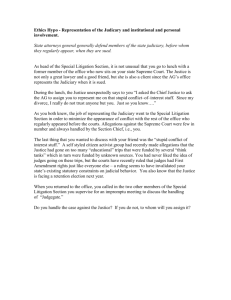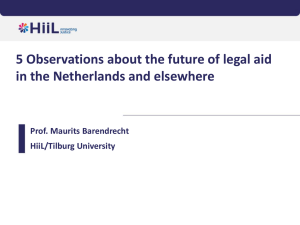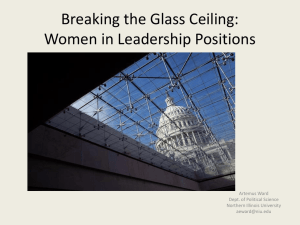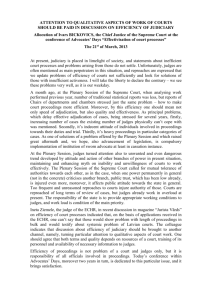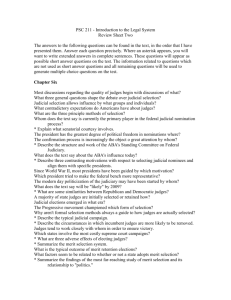Inaugural Speech on Golden Jubilee
advertisement
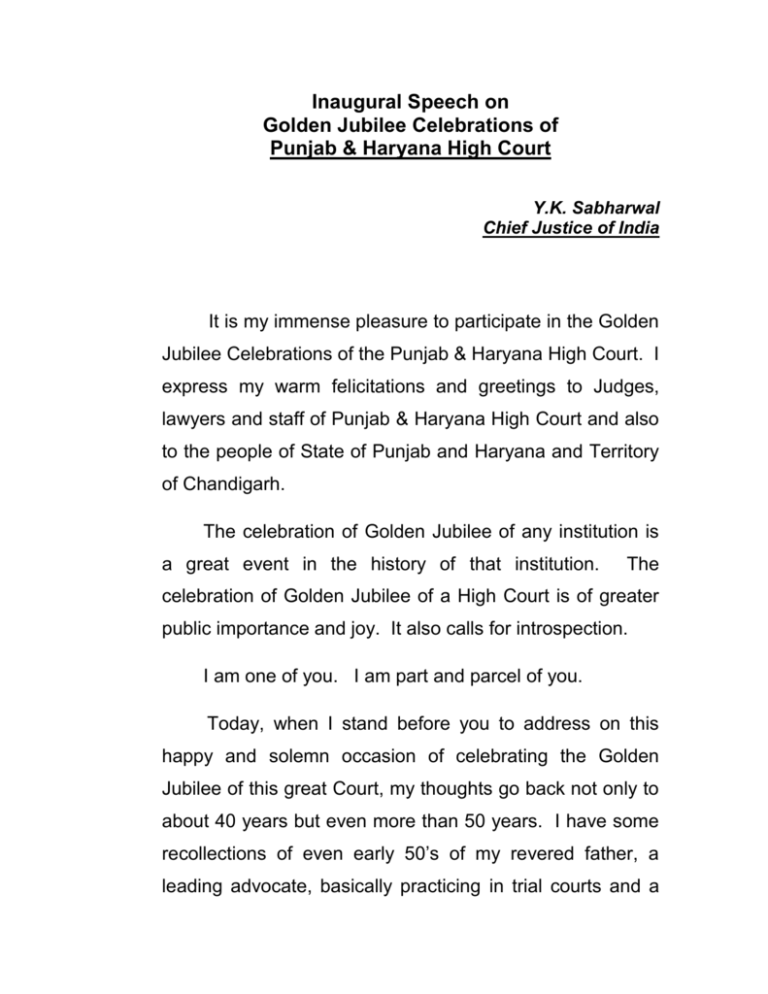
Inaugural Speech on Golden Jubilee Celebrations of Punjab & Haryana High Court Y.K. Sabharwal Chief Justice of India It is my immense pleasure to participate in the Golden Jubilee Celebrations of the Punjab & Haryana High Court. I express my warm felicitations and greetings to Judges, lawyers and staff of Punjab & Haryana High Court and also to the people of State of Punjab and Haryana and Territory of Chandigarh. The celebration of Golden Jubilee of any institution is a great event in the history of that institution. The celebration of Golden Jubilee of a High Court is of greater public importance and joy. It also calls for introspection. I am one of you. I am part and parcel of you. Today, when I stand before you to address on this happy and solemn occasion of celebrating the Golden Jubilee of this great Court, my thoughts go back not only to about 40 years but even more than 50 years. I have some recollections of even early 50’s of my revered father, a leading advocate, basically practicing in trial courts and a person who not only believed but also followed high ethical values in the profession and also in personal life and in whom, I see the image of God and it is because of his blessings, I am where I am today. I remember his sometimes going to Simla to appear in the High Court since, at that time, appeals against the orders of subordinate courts at Delhi could be preferred only at the High Court at Simla. This is besides his enrollment as an advocate in Lahore High Court and his law education at Lahore. The High Court at Simla in a way was a successor of Lahore High Court. In this way, I have more than half a century association with this Court. Further, when I joined the legal profession more than 40 years ago and when I see the sanad/certificate of enrollment issued by the Bar Council which made me eligible to act and plead as an advocate, I see that document being signed by the then Chairman of the Bar Council who later became Chief Justice of this Court. These are my associations with this Court. I could not have asked for more from Almighty who has bestowed on to me this opportunity to inaugurate these celebrations as head of judiciary in respect of an institution which has practically given me everything. I remember, though more than 41 years have passed, that when I started practice as a junior advocate, the Circuit Bench of Punjab High Court at Delhi was located in small bungalow 2 in Civil Lines area of Delhi. Delhi was within the jurisdiction of this Court in so far as judiciary is concerned. On establishment of Delhi High Court in 1966, some judicial officers opted for Delhi and some for Punjab & Haryana. I am beholden to you all for giving me this opportunity to be a part of Golden Jubilee Celebrations. Golden Jubilee is an occasion to remember all those great Judges who sat on the Bench and all those great lawyers who appeared in Court and helped in dispensation of justice. It is a function of both Bench and the Bar. It is also a function which gives us an opportunity to reflect as to whether we are preserving the rich legacy and heritage which we have inherited from great Judges and lawyers alike. We have to ask the question whether we are enhancing the image further or there has been some dent in it. When I glanced through the old list of Judges and lawyers, I found so many names of great judges and eminent and distinguished lawyers; many of them later became Judges and number of them not only reached the Apex Court but also adorned the office of the Chief Justice of India. This Bar has had great distinction of sending two out of only four appointments directly made from amongst 3 members of Bar to the highest Court of land and one of them became Chief Justice of India. Many lawyers became Judges and later Chief Justices of this Court and various other High Courts as well. This Court gave four Chief Justices of India. I am purposely not mentioning names of Judges and lawyers because for paucity of time, it is not possible to mention all the names as the number of those falling in the category of great Judges and very eminent lawyers is very large. We are lucky that some of them are present amongst us and are a part of this august gathering. I salute and bow my head in the memory of all those who are no more and also those who are present here to give blessings to us all. Presently too, this Court has a large number of eminent Judges and distinguished lawyers. I have no doubt that all of them are working very hard. But the fact is that despite these efforts and hard work, the number of cases are on rapid increase. Result is delay in disposal of cases both in High Court and subordinate courts. Litigants are fully justified when they expect decision of their cases in a reasonable time. One factor that can affect the image and erode the faith of a common man in judiciary is delay in disposal of cases. If we cannot enhance the image which we have inherited, it is our duty and responsibility to at least ensure that it is maintained and no dent is created in it. We 4 cannot always live on our past glory. The people of this country have great trust and faith on the judiciary. That faith is our strength. It has to be maintained at every cost. The common man considers the judiciary as ‘the ultimate guardian of his rights and liberties.’ No institution can take for granted the respect of the community. It has high expectations and constantly demands proof of its utility. If problem of delay is not tackled now, it can shake people’s faith. Dr. S. Radhakrishnan, our former President said : “If people lose respect for law and respect for the courts which administer law, it will be a bad day for us. It is essential for the country to respect law, for the Government of the country to respect law and for the courts to maintain the sanctity and purity of legal administration and dispensation of justice. That is absolutely necessary, if the rule of law has to be continued in this country as it has to be continued.” 5 Law’s delays are causing grave concern to the people. With the enactment of large number of laws, the volume of work in courts has increased enormously without any increase let alone corresponding increase in the strength of Judges at all levels. People have become more and more aware of their rights and are no longer willing to submit to arbitrariness any where. It is necessary to re-evaluate the functioning of the judiciary and to bring about a qualitative change in the justice delivery system so as it bring to in tune with the hopes and aspirations of the people. The judiciary has to devise new methods, forge new tools and innovate new strategies for the purpose of reaching social justice to the common man. Today the judiciary is being increasingly called upon to enforce the basic human rights of the poor and the deprived ones and this new development is making the judiciary a dynamic and important institution of the State. All this is possible when there is full cooperation from Governments. Let us always remember the great words of MagnaCarta: “to none shall we deny justice, to none shall we delay justice, to none shall we sell justice.” 6 Pandit Jawaharlal Nehru, while opening the High Court building of Punjab & Haryana High Court, said “Justice in India should be simple, speedy and cheap”. I hope we would be able to translate the dream of Pt. Nehru into reality in near future. On this occasion, I wish to mention only three measures which if taken immediately, can to some extent help in solving the problem of delay and provide some relief to the litigating parties. First is removal of delay that takes place in filling of the vacancies; second, about application of the management techniques; and third adopting alternative measures with a view to provide speedy justice to the common man. Besides increasing number of Judges in a phased manner, at all levels, as a first step, it is absolutely imperative to fill existing vacancies at all levels in the shortest possible period. You have to develop zero vacancy or nearly zero vacancy culture. Filling of vacancies particularly in District Courts has to be an ongoing process. Systems have to be developed. Second, we have to make full use of modern technology. Time of Courts has to be used for effective hearing and not for procedural matters like time spent for 7 ordering service when party is not served or filing of pleadings etc. This work has to be delegated to supporting staff. State must provide necessary infrastructure and staff to implement these steps. No adjournment culture has to be developed by courts. We have also to discipline ourselves. Priorities have to be fixed. Old and new cases have to be segregated. For every case and every step, time schedule has to be fixed and followed. With computerisation, every case from filing to decision has to be monitored. Thirdly, boost has to be given to ADR methods in civil matters. The huge pendency of criminal cases in criminal courts more particularly in magisterial courts where common man is affected the most, is a matter of great concern. Some cases have to be taken out of normal channel of courts. Petty offence cases are large in number. You should consider without any loss of time the appointment of retired officers as Special Magistrates. Courts have to discourage frivolous litigation and impose heavy costs on litigants who bring frivolous litigations – whether it be individuals, corporations or Governments. Appointment of retired Judges as ad hoc Judges to clear old criminal appeals and other old matters in High Court has to be seriously considered. The Government 8 has principally accepted this suggestion. My gratitude to Hon’ble the Prime Minister and Dr. Bhardwaj, our Minister for Law and Justice for accepting this suggestion. See figures of cases in High Court and subordinate courts. If we do not reverse trend now, there will be no magic wand in years to come. I would appeal to all stake-holders – Judges, Lawyers, Government of both States and Centre and other litigants to do everything possible to provide to the common man speedy and inexpensive justice. We must remember that in the final analysis, the strength and failure of our judicial system, its utility and credibility as a necessary organ of the State in a civilized society, the respect it would evoke and the confidence it would inspire would depend upon the way it satisfies the hopes and aspirations of the people, of the common man in the quest for justice, in keeping the scales even in any legal combat between the rich and the poor, between the mighty and the weak, between the State and the citizen, without fear or favour. Twenty seven years ago, Justice H.R. Khanna made a speech at the Golden Jubilee of the Mathura Bar 9 Association1 and raised some issues. I raised the same issues, as were raised by Justice Khanna, at the recent celebration of the golden jubilee of the High Court of Madhya Pradesh, and I place them before you as well. We must ask ourselves and find right answers to those issues as we celebrate fifty years of this High Court: Does our judicial system satisfy the demand for justice? Does it fulfill the expectations of the people? Are Courts of law looked upon as temples of justice, where it is administered without fear, or favor, oblivious of the personalities of the litigants and without regard to their long purse or high status? Does the common man have an abiding and unshakeable faith in the process of justice as administered by the courts particularly with reference to speed and expense. It is upon the right answer to these questions that our judicial system would ultimately be judged. Broadly, we must aim at : (1) Zero vacancy culture at all levels. Save Court time (2) Awareness about importance of Court’s time to be spent only for effective dispensation of justice: 1 (1978) 1 SCC (J) 25. 10 (A) Only those cases before court which can be heard. (3) (B) Shift Petty offence cases from normal channel (C) No adjournment culture (D) Discourage frivolous cases. Give priority to certain cases, such as : (A) Corruption cases of high and mighty. (B) Rape and sexual harassment. (C) Intellectual Property related Arbitration. Ladies and Gentlemen, I would end up by prayer to the Almighty to shower His blessings on the State of Punjab and Haryana, particularly, the judicial and legal fraternity so that it can come up to just aspirations of the citizens. I assure you of full cooperation. ☻☻☻☻☻ 11
